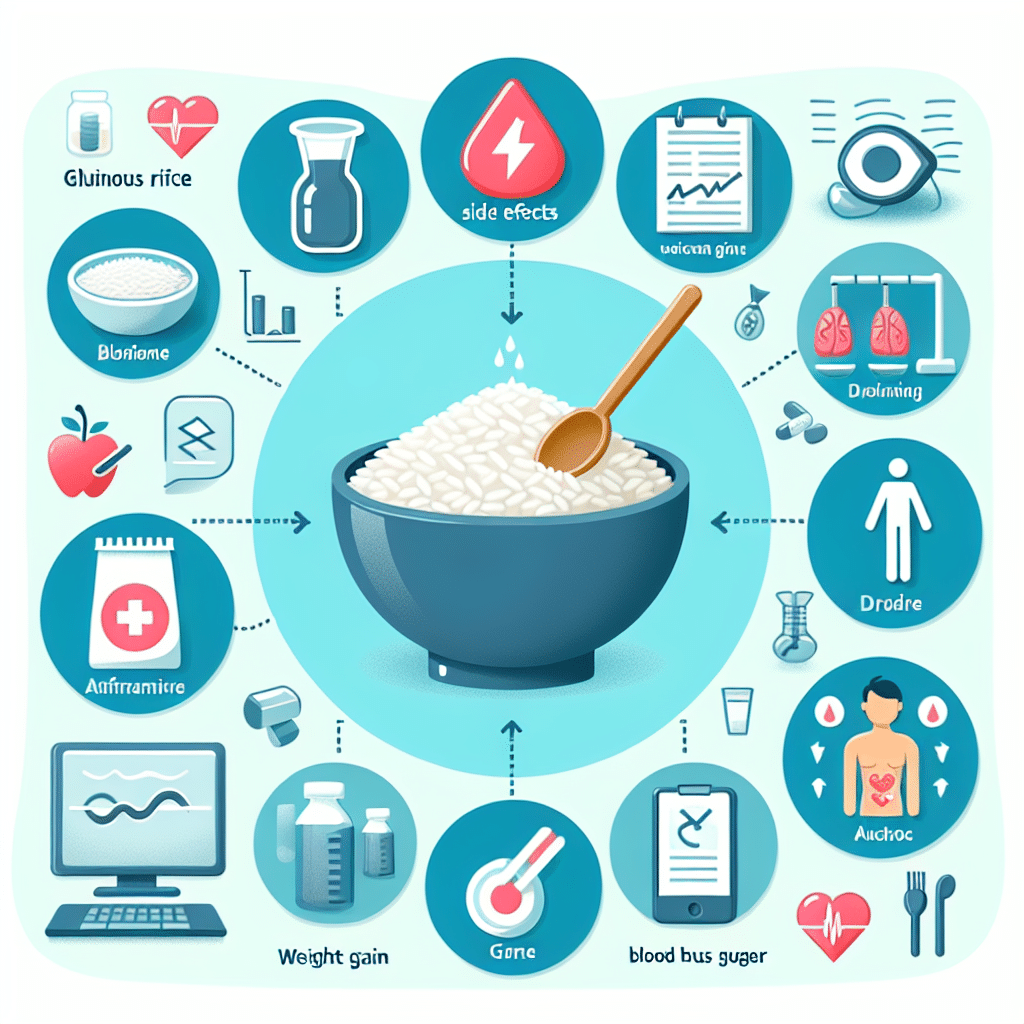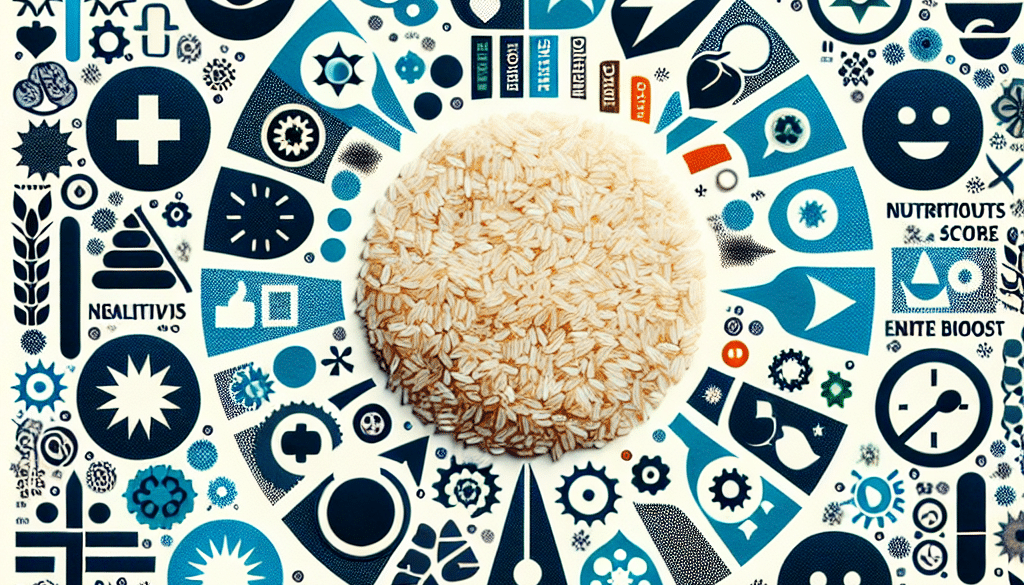What Are The Side Effects Of Glutinous Rice?
-
Table of Contents
- Glutinous Rice Side Effects: What You Need to Know
- Potential Digestive Issues
- Impact on Blood Sugar Levels
- Nutritional Considerations
- Weight Management Challenges
- Allergic Reactions and Intolerances
- Environmental and Ethical Concerns
- Conclusion: Balancing the Benefits and Side Effects
- About ETprotein
Glutinous Rice Side Effects: What You Need to Know

Glutinous rice, also known as sticky rice or sweet rice, is a staple in many Asian cuisines. It is known for its unique sticky texture and is often used in desserts, sushi, and various traditional dishes. While it is a source of energy and can be part of a balanced diet, it is important to be aware of the potential side effects associated with its consumption. This article will explore the side effects of glutinous rice and provide insights into how it may affect your health.
Potential Digestive Issues
Glutinous rice is high in starch, specifically a type called amylopectin, which makes it very sticky when cooked. For some individuals, this high starch content can lead to digestive issues such as:
- Bloating
- Gas
- Constipation
These symptoms occur because the sticky nature of the rice can slow down digestion, leading to discomfort for those with sensitive stomachs or pre-existing digestive conditions.
Impact on Blood Sugar Levels
One of the most significant concerns with glutinous rice is its impact on blood sugar levels. Glutinous rice has a high glycemic index (GI), which means it can cause a rapid spike in blood sugar levels after consumption. This can be particularly problematic for individuals with diabetes or those at risk of developing the condition. Consistent consumption of high-GI foods can lead to:
- Increased risk of type 2 diabetes
- Weight gain
- Cardiovascular disease
It is essential for those with blood sugar management issues to consume glutinous rice in moderation and balance it with low-GI foods to mitigate these effects.
Nutritional Considerations
While glutinous rice provides energy, it is not particularly nutrient-dense. It lacks dietary fiber, which is essential for maintaining a healthy digestive system and can contribute to a feeling of fullness. Additionally, glutinous rice is low in essential vitamins and minerals compared to other whole grains. This can lead to nutritional deficiencies if it is a significant part of one’s diet without adequate intake of other nutrient-rich foods.
Weight Management Challenges
Due to its high calorie and carbohydrate content, glutinous rice can contribute to weight gain if consumed in large quantities without proper portion control. This is especially true for individuals with a sedentary lifestyle or those who are not balancing their diet with physical activity. The lack of fiber also means it may not be as satisfying as other whole grains, potentially leading to overeating.
Allergic Reactions and Intolerances
Although rare, some individuals may have an allergy or intolerance to glutinous rice. Symptoms of an allergic reaction can include:
- Skin rashes
- Nausea
- Vomiting
- Diarrhea
- Anaphylaxis in severe cases
Those with a known allergy to rice or rice products should avoid glutinous rice and seek alternative grains.
Environmental and Ethical Concerns
The cultivation of glutinous rice, like other types of rice, can have environmental impacts. Rice paddies are known to produce methane, a potent greenhouse gas. Additionally, the water-intensive nature of rice farming can lead to water scarcity issues in some regions. Ethical concerns also arise with the labor conditions in some countries where rice is a major crop. Consumers who are environmentally conscious or concerned about fair labor practices may want to consider these factors when purchasing rice products.
Conclusion: Balancing the Benefits and Side Effects
Glutinous rice can be a delicious and culturally significant part of many diets, but it is important to be aware of its potential side effects. Digestive issues, blood sugar spikes, nutritional deficiencies, weight management challenges, and rare allergic reactions are all possible concerns. By understanding these side effects and consuming glutinous rice in moderation, individuals can enjoy its unique qualities without compromising their health.
For those looking for alternative protein sources that may be easier to digest or have a lower glycemic index, ETprotein offers a range of products that could be beneficial. Their organic rice protein, pea protein, and other plant-based proteins provide options for those seeking to diversify their protein intake while maintaining a balanced diet.
About ETprotein
ETprotein, a reputable protein and L-(+)-Ergothioneine (EGT) Chinese factory manufacturer and supplier, is renowned for producing, stocking, exporting, and delivering the highest quality organic bulk vegan proteins and L-(+)-Ergothioneine. They include Organic rice protein, clear rice protein, pea protein, clear pea protein, watermelon seed protein, pumpkin seed protein, sunflower seed protein, mung bean protein, peanut protein, and L-(+)-Ergothioneine EGT Pharmaceutical grade, L-(+)-Ergothioneine EGT food grade, L-(+)-Ergothioneine EGT cosmetic grade, L-(+)-Ergothioneine EGT reference grade and L-(+)-Ergothioneine EGT standard. Their offerings, characterized by a neutral taste, non-GMO, allergen-free attributes, with L-(+)-Ergothioneine purity over 98%, 99%, cater to a diverse range of industries. They serve nutraceutical, pharmaceutical, cosmeceutical, veterinary, as well as food and beverage finished product distributors, traders, and manufacturers across Europe, USA, Canada, Australia, Thailand, Japan, Korea, Brazil, and Chile, among others.
ETprotein specialization includes exporting and delivering tailor-made protein powder and finished nutritional supplements. Their extensive product range covers sectors like Food and Beverage, Sports Nutrition, Weight Management, Dietary Supplements, Health and Wellness Products, and Infant Formula, ensuring comprehensive solutions to meet all your protein needs.
As a trusted company by leading global food and beverage brands and Fortune 500 companies, ETprotein reinforces China’s reputation in the global arena. For more information or to sample their products, please contact them and email sales(at)ETprotein.com today.












